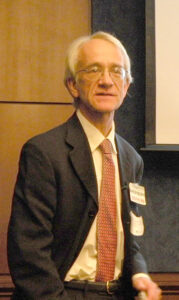Statistician’s View Given at Congressional Briefing on Climate Science

Richard L. Smith of The University of North Carolina speaks during the congressional briefing “Climate Science: Key Questions and Answers.”
Smith began with a slide show about the role statisticians play in climate change research. He noted that many criticisms of climate change research in the news recently are not new and that robust criticism is a natural and necessary part of the scientific process. He did agree that climate science would benefit from a fuller and more open discussion in which differences of scientific viewpoint are addressed as part of an ongoing scientific process.
Smith illustrated his points with the “hockey stick” temperature time series and statistical analyses of claims that global mean temperatures have decreased since 1998. From his temperature trend analysis, he concluded there was no evidence of a decrease in temperatures post-1998. In fact, allowing a change in slope in 1998, the analysis showed the temperature trend increases after 1998, more so after adjusting for El Niño.
Addressing the hockey stick controversy—a critique of the statistical methods in the 1998–1999 analysis of Michael Mann, Raymond Bradley, and Malcolm Hughes showing the temperature time series from tree ring proxy data having a hockey stick shape—Smith said subsequent authors showed the basic hockey stick shape to be valid. He illustrated this using the “principal components analysis,” in which the hockey stick shape emerges as one includes higher components, which are necessary for proper application of this technique.
Smith concluded his talk with slides about data access and peer review. Regarding the former, he noted, the “climate science community is already one of the most open about making data available to the rest of the scientific community and the general public.” Concerning peer review, Smith urged climate skeptics to publish their results in scientific journals, rather than on blogs and other unofficial outlets, and emphasized the role journal editors and reviewers must play to realize this.
Richard Alley, an earth scientist from Penn State, and Warren Washington, an atmospheric scientist and climate modeler at the National Center for Atmospheric Research, also spoke.
Washington explained peer review, the process for the Intergovernmental Panel on Climate Change reports, and the role of skeptics. He also discussed the then yet-to-be-released America’s Climate Choices reports from the National Academies and other upcoming National Research Council reports. He closed with a slide on measures to make climate change research more trustworthy, which touched upon transparency, data access, reproducibility, and the quality of scientific information provided to policymakers.
Alley presented the case that, with high scientific confidence, humans are raising carbon dioxide levels—which is warming the climate—and changes to date are small compared to what can be expected if action is not taken. Using the analogy of the scientific evidence being a braided rope, rather than a single hair, he described high scientific confidence as having the following attributes:
- No single mistake, or small set of mistakes, could notably change the results
- The results do not depend on any single fact, data set, model, analysis, investigator, or laboratory
Instead, major results depend on multiple lines of evidence from many investigators and labs, collected in many ways and independently assessed by many groups.
Presentation slides and videos of the talks are available on the ASA website.

















